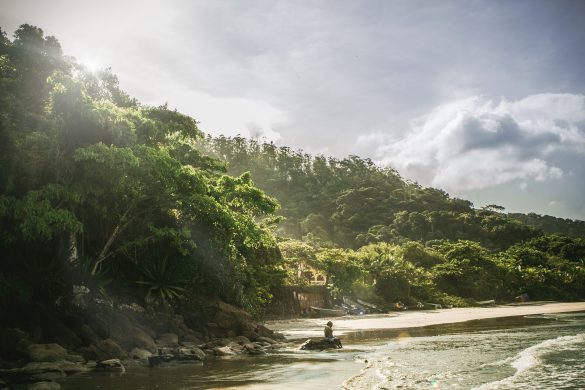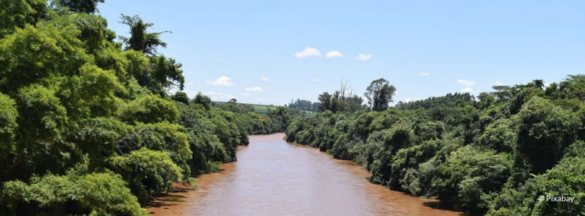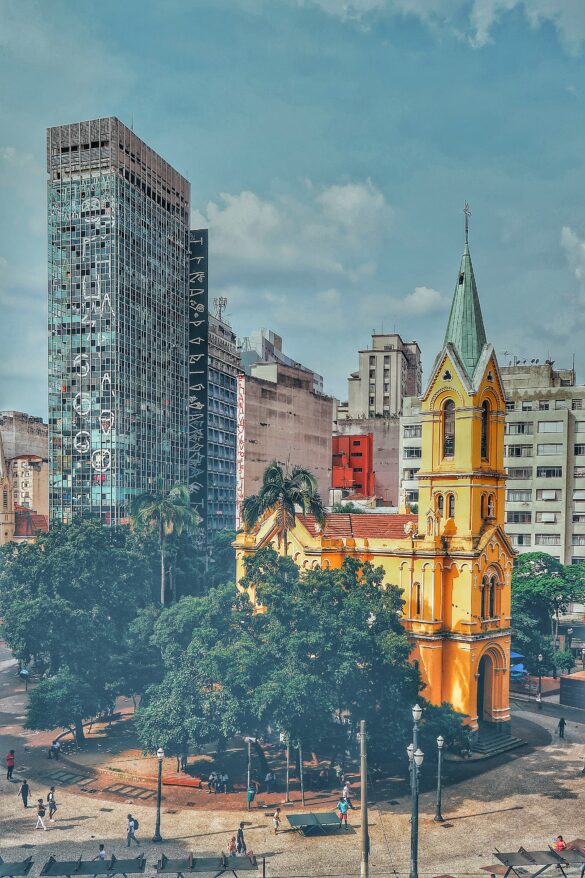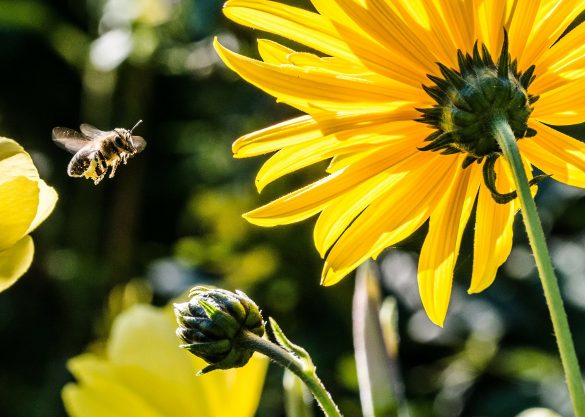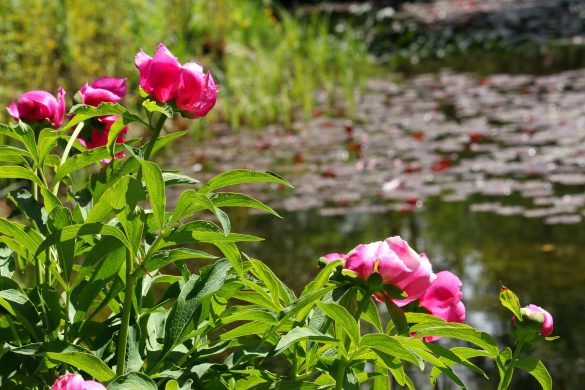São Paulo has over 730 native species of bees. Their sustainable use, with conservation strategies, is key for the region’s economic and environmental success.
Sao Paulo is the most industrialized and richest state in the country. Though industry plays an important role in the economy, agricultural production is also essential, in 2018 the income generated accounted for over 20% of all agricultural activity in Brazil. Sugar cane, beef and oranges for industry play a particularly important role with a production value of US$ 10.3 billion in 2018.
The state government of Sao Paulo is well aware of the importance of bees as the most important pollinator of fruits, vegetables, flowers, crops and other native plant species that provide food for the fauna and the population as well, and the dependent relationship of crop production with this phenomenon. It was actually the Brazilian government that, at the 2nd SBSTTA meeting in 1996, proposed the creation of a work program on agricultural biological diversity which included a proposal for the establishment of an “International Pollinator Conservation Initiative”. In 1999, Sao Paulo’s leadership on the matter grew with the launch of the Sao Paulo Declaration on Pollinators, that included recommendations on the sustainable use of pollinators with an emphasis on bees.
Much has been achieved since then; currently, the state of Sao Paulo has an Action Plan to 2020 with a detailed description on the state’s efforts to implement the Aichi Biodiversity Targets, in which their many groups of pollinators play a key role. Also, the state government is working to mitigate the impacts of the historic land-use change from the past and the resultant habitat loss that has affected pollinators. Even though native forest coverage in the state is over 4.34 million hectares, about 17.5% of their territory, more than 110 conservation units have been established, resulting in the protection of more than 1.5 million hectares of land. Much work has been done in restauration projects in the rural proprieties of the state, as they conform to the new forest law.
The group of pollinators targeted by those conservation actions are the hundreds of native species, the stingless social bees and the solitary bees. They have been affected by forest fires, lack of availability of nesting sites, low diversity of attractive native plant species in restoration projects, lack of knowledge of the population on the pollination importance and specially the growing use of pesticides, including aerial spraying. The exotic Apis mellifera, introduced during the 19 century and with economic importance to the state, also benefits from the protective measures that have been adopted in the State.
In the last years, the numbers of cases of bee mortality has been escalating in Brazil. To address actions to understand what is causing those deaths and protect the bees, many actions are being undertaken by academia, private sector and non-governmental organizations, as researches, campaigns and mapping of bee mortality, besides multi residual analysis of some cases when it was possible. As an inspiring example, an impressive public awareness campaign and educational program is being done by non-governmental organizations in the schools of Ribeirão Preto to promote bee protection: without them, we will have no food in the future.
In 2017, the Technical Group on Pollinators Protection started its works with the goal to define state strategies to be adopted for the protection of insect pollinators, in the benefit of the ecosystems and society as well. This group is formed by technical specialists of the state Secretariats, to contribute in the fields of conservation, agriculture, animal health, pesticides regulation, environmental surveillance, health and education. The group was formalized in 2018, through a Resolution of the State Secretariat for the Environment and runs by the budgets of the respective Secretariats.
Through periodic meetings and technical visitations, the specialists share knowledge and bring proposals of solutions for the challenges. Wherever necessary, specialists of other institutions that can contribute with a specific subject are invited to the meetings. Workshops to address questions to specific subjects are scheduled as well as a final event to share the results with the civil society.
In detail, the objectives of the Technical Group on Pollinators Protection are:
– Diagnosis of the situation and assessment of the main threats of insect pollinators, with emphasis on the species of native bees;
– Characterization of ecosystem services provided by pollinators and their economic value, and proposal of strategies and regulations for the sustainable use of directed pollination as a tool for low carbon agriculture.
-Proposal of public policies for the protection of insect pollinators in natural/restoration and agricultural production environments, guidelines for bee species management in areas subject to environmental licensing and for the promotion of the native beekeeping, including urban areas, with the proposal of a regulation on the meliponiculture activity.
All activities of the Group and its members are bringing great results that go beyond governmental action and bring together the private sector, academia, civil society and NGOs. Some of the greatest actions implemented and success stories taking plae in São Paulo are the following:
- To create bee friendly forests, at the end of 2018, São Paulo launched a guiding list with native tree and shrub species, their flowering season, the resources their offer to the bees (nectar, pollen, resins) and the bee species that may use them for food and nesting sites. This list is also used to guide reforestation projects and to enrich bee pastures;
- The specialists of the groups also support the development of local action plans and municipal laws on the importance and protection of pollinators;
- São Paulo launched three programs for Payment for Environmental Services in 2018, in which the bee keeping is valued linked to conservation of native vegetation, chains of sustainable products and Nature Reserves;
- The Secretariat for Agriculture and Supply, created a special taskforce of a agents to offer support and advice to the honeybee and native bee keepers;
- Agrishow, the biggest agribusiness fair in Latin America, gave pollinators in its most recent edition (April 2019) the leading role and it presented it as one of the main themes of the fair. The sugarcane sector signed a protocol with the Secretariat for Agriculture and Supply to address actions of best practices in the use of pesticides, including aerial spraying;
- A State Plan for the Strengthening of Apiculture and Meliponiculture was launched by the end of 2018, with the goal of increase honey production and value of both productive chains in 10 years in São Paulo;
- The São Paulo Agribusiness Expansion Fund – FEAP / BANAGRO, has launched a credit line directed to Sustainable Animal Breeding, including apiculture and meliponiculture.
Meliponiculture is now an activity in true expansion in the state of São Paulo, the increased public awareness and the number of events, workshops and general interest on native bees in the last years has drastically augmented, however there continues to be obstacles to overcome.
The main challenge is to continue to strengthen sustainable development and make it a reality in all territories of the state, with the continued support of stakeholders. It is important to note that pollinators protection is an issue that urges participation of the four main actors in the state: government, academy, non-governmental organizations and the private sector. Finally, civil society needs to be more engaged and acknowledge the consequences of biodiversity loss and the role pollination plays in the conservation of ecosystems and its impact on food production. All of us can contribute for the change and for pollinator’s protection, as they are a fundamental part of life on earth.
Related links:
- Lista Orientativa de Espécies Arbóreas e Arbustivas de Ocorrência Regional, Calendário de Florescimento e Recursos para a Melissofauna (click in the tree logo)

